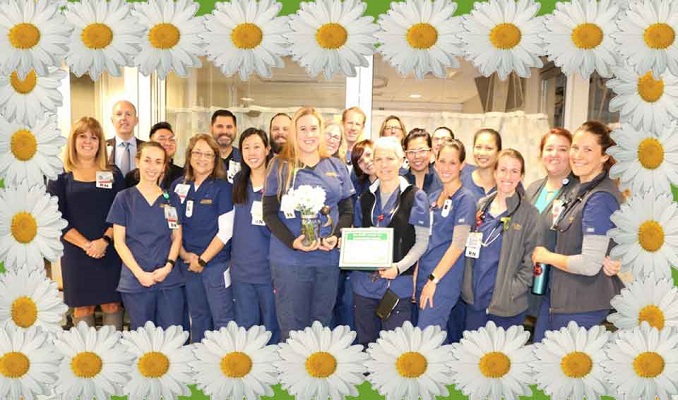DAISY Award
Congratulations to Kelly Hamilton
Congratulations to
Kelly Hamilton, RN, BSN, CCRN
MICU

In September a middle age gentleman with dwarfism was transferred from an outside hospital. He was originally admitted from the transferring hospital following a cardiac arrest while being seen for tachypnea. He was resuscitated and intubated. Pneumonia was the presumed cause of his respiratory failure and cardiac arrest and was treated subsequently with antibiotics. The outside facility attempted to extubate him but failed necessitating reintubation. It was felt that due to differences in anatomy, the patient would benefit from better resources at UC Davis and possibly a tracheostomy.
During this admission there have been multiple events when the patient desaturates simply because of a slight turn and movement dislodging the endotracheal tube. Aside from the unstable airway, the nursing staff was challenged to deal with the patient's disabilities. The patient has been nearly deaf at baseline for years. He is somewhat able to read lips but otherwise it is difficult to communicate with him. Since his admission multiple nurses have taken care of him which lacked continuity of care.
After being hospitalized for four days Kelly Hamilton became his primary nurse. She developed a rapport with his family and especially with the patient. The patient was taken off sedation and started to be more interactive. After being hospitalized for over a month, a difficult decision had to be made from his family regarding a treatment course. Discussion for a tracheostomy was in the patient's plan of care but the family believed that the patient would not want to have a tracheostomy and would likely try to extubate himself. However, from the multiple bronchoscopy studies, the patient's proximal airway collapses making extubation dangerous and predisposes the patient to respiratory failure. Added to the problem is the patient's secondary diagnosis of spinal stenosis that will require spinal surgery to stabilize his atlantoaxial joint and prevent paralysis related to hyperextension from tracheostomy. His family was unsure if they were going to pursue this surgery.
Meanwhile the patient seemed to intermittently have capacity, but assessment was very limited because of his intubated status, poor hearing/vision, and unclear baseline cognition. Palliative care, bioethics and court conservatorship were included in the plan.
Numerous bedside and formal multi-disciplinary conferences were held during the first 4 weeks in ICU to establish the plan and each time, the team faced a brick wall in making the procedure happen. His family was repeatedly asked to make the decision. Ambivalence and family mistrust of the treatment team made the family feel pushed to make these decisions for the patient. Each family conference became difficult and continued to arrive at no decisions.
Kelly approached me one morning and looked very concerned about the patient's goals of care. She said that she has taken care of this patient long enough to know he was capable to make decisions. Kelly painstakingly wrote notes for the patient to read and establish communication. She made the patient wear his reading glasses and hearing aid. She developed a way to recognize and read lips 70-80% at a time despite patient intubation. She kept the patient’s family involved during her conversations with the patient. The family started to see what Kelly was seeing in the patient, his capacity to be involved and the ability to make decisions for himself.
We looked back on the multiple conferences and discussions between family members and the treatment team, but the patient was never physically included. Kelly started documenting her conversations with the patient and family. She addressed her concerned with the medical team. After numerous "show and tell" and simple tasks performed by the patient and witnessed by the physicians, the mufti-disciplinary team was convinced of the patients’ capacity to make decisions. Kelly pursued the impossible which is to hold a family conference with the patient making his own decisions. On Oct 15, 2018, a multi-disciplinary care conference was held, and the patient was deemed with capacity to decide for himself. The family fully supported his decision. His tracheostomy and spinal surgery were done on Oct 24, 2018.


